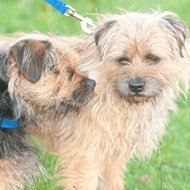
Young dog thrives with the help of faithful father and vets
A devoted canine father has taken on the role of guide dog for his son Lucky, who was born without retinas and has never been able to see.
Lucky's blindness initially caused problems and he would often get lumps and bumps from running head-first into things.
With a little help from faithful father Scruff, the vets at PDSA and his loving owners, two-year-old Lucky is now coping extremely well with his disability.
Senior PDSA vet, Elaine Pendlebury, said: "Dogs can behave in a unique and extraordinary way. They’re extremely social animals and can help both pets and people in ways that never fail to amaze.
"It’s inspiring to us all that Scruff acts as a guide dog to his canine companion and how he looks after his son to the best of his ability."
Owner Jim Leonard, 65, from Glasgow, says the family were initially worried about how Lucky would cope with his blindness.
"We started to take Lucky and Scruff on walks together and it was amazing to see Scruff starting to take charge, looking after Lucky and checking he was okay.
"Now Scruff licks him on the face and guides him where to go. If they are separated for a little while, Scruff will rush over to Lucky and lick him as if to say ‘sorry I had to leave you’."
After discussing the problem with PDSA vets, Jim says the family took several steps to make life easier for Lucky, including wearing bells at the bottom of their trousers and putting strong scents in rooms where there are objects he may hurt himself on, training Lucky not to go in there.
Jim said: "It’s hard work to care for a pet with a disability but so rewarding. We’re extremely grateful to the PDSA vets and nurses at the pet hospital in Tollcross for the help and support they have given us and Lucky, which has helped him to blossom into a loving, confident dog."
Image courtesy of PDSA



 FIVP has shared a survey, inviting those working in independent practice to share their views on the CMA's proposed remedies.
FIVP has shared a survey, inviting those working in independent practice to share their views on the CMA's proposed remedies.